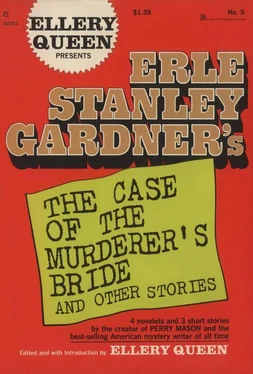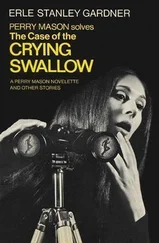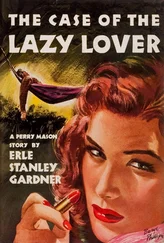Erle Gardner - Erle Stanley Gardner’s The Case of the Murderer’s Bride and Other Stories
Здесь есть возможность читать онлайн «Erle Gardner - Erle Stanley Gardner’s The Case of the Murderer’s Bride and Other Stories» весь текст электронной книги совершенно бесплатно (целиком полную версию без сокращений). В некоторых случаях можно слушать аудио, скачать через торрент в формате fb2 и присутствует краткое содержание. Город: New York, Год выпуска: 1974, Издательство: Davis Publications, Жанр: Классический детектив, на английском языке. Описание произведения, (предисловие) а так же отзывы посетителей доступны на портале библиотеки ЛибКат.
- Название:Erle Stanley Gardner’s The Case of the Murderer’s Bride and Other Stories
- Автор:
- Издательство:Davis Publications
- Жанр:
- Год:1974
- Город:New York
- ISBN:нет данных
- Рейтинг книги:4 / 5. Голосов: 1
-
Избранное:Добавить в избранное
- Отзывы:
-
Ваша оценка:
- 80
- 1
- 2
- 3
- 4
- 5
Erle Stanley Gardner’s The Case of the Murderer’s Bride and Other Stories: краткое содержание, описание и аннотация
Предлагаем к чтению аннотацию, описание, краткое содержание или предисловие (зависит от того, что написал сам автор книги «Erle Stanley Gardner’s The Case of the Murderer’s Bride and Other Stories»). Если вы не нашли необходимую информацию о книге — напишите в комментариях, мы постараемся отыскать её.
Erle Stanley Gardner’s The Case of the Murderer’s Bride and Other Stories — читать онлайн бесплатно полную книгу (весь текст) целиком
Ниже представлен текст книги, разбитый по страницам. Система сохранения места последней прочитанной страницы, позволяет с удобством читать онлайн бесплатно книгу «Erle Stanley Gardner’s The Case of the Murderer’s Bride and Other Stories», без необходимости каждый раз заново искать на чём Вы остановились. Поставьте закладку, и сможете в любой момент перейти на страницу, на которой закончили чтение.
Интервал:
Закладка:
“As soon as I saw that, picture I was certain I’d seen the man before. It isn’t a very good picture and he had a mustache at the time, but I feel certain it’s the same man. I’m sending the picture along together with the clipping.
“I think the Fletcher accident should be checked, and I think someone had better ask Mr. Ives how it happened he changed his name.
“This is just a hunch, and if you do anything about it, for heaven’s sake don’t let Nan know that I wrote this letter. I worked with her for several years, and I like her and she used to like me. I don’t want her to think I’m getting nosey and interfering in her affairs.”
Corporal Cortland put this letter to one side and during the course of the evening mentioned it to his friend Dr. Herbert Dixon, the medico-legal expert on forensic pathology and homicide investigation. Dr. Dixon became interested.
It took the police less than an hour to locate the apartment house where Mr. and Mrs. Ives lived. Dr. Dixon and Corporal Cortland drove around to the place. The manager, a large friendly woman named Mrs. Meehan, explained that Mr. and Mrs. Ives had left on a trip. They had given up the apartment and had loaded some of their baggage into their car; the balance had gone into storage. She understood they were going to live in Arizona. They had taken their boat, outboard motor, and trailer with them.
Mrs. Meehan informed them that Mr. Ives was a remarkable personality — charming, magnetic, polished. His wife was sweet and really beautiful. They were very happy together. Mr. Ives didn’t work. He evidently had some sort of independent income. Mrs. Meehan thought he was interested in mining.
Mr. Ives had settled all their bills before they left. They had only been gone a couple of days and the apartment wasn’t cleaned up yet. It would be put in shape tomorrow. Mrs. Meehan let Corporal Cortland into the apartment and left him and Dr. Dixon there to look around.
Dr. Dixon found the copy of the newspaper from which a news item had been cut out. The edges of the cut showed that it had been made with a sharp knife held by someone with a steady hand.
Corporal Cortland rang up the newspaper office, got them to check the issue in question and relay the story to him. When Dr. Dixon learned that it was a story of a tragic accident in which two swimmers had been lost in Lake Havasu, he became thoughtful.
A check of the telephone company showed that Ives had paid up his account. The record showed that the last long-distance call on record was to Searchlight, Nevada.
When Dr. Dixon phoned the Nevada number, the man who answered remembered Ives’s call well. The man operated a service station, and from his office he could relay calls over a private telephone line which stretched across the desert to Lee Bracket’s Eldorado Landing, a distance of 50-odd miles by road.
Ives had asked him to relay a call through to Bracket’s to see if accommodations were available, and the reservations had been made.
The service-station manager said that usually when he accommodated people by making reservations for them, they at least did him the courtesy of stopping in at his station to say thank you and to fill up their tanks with gasoline.
Ives had done neither.
After this conversation Dr. Dixon reached a quick decision. “I’ve been planning on a little vacation, Ed. I’m going to drive down there to the Colorado. Think you could get permission to go along?”
“I could if you recommended it as an investigative job,” Corporal Cortland said, grinning.
“I’ll recommend it,” Dr. Dixon grinned back.
The road to Bracket’s camp wound down a long slope from the crest of the mountains to the river. The last two or three miles ran past weird rock formations that looked like great petrified mushrooms.
Where the Colorado River had once been a turgid, dangerous stream, there was now a clear blue lake stretching from Davis Dam, some 40 miles to the south of Eldorado Wash, to Hoover Dam, 20 miles to the north.
“This,” Corporal Cortland announced with conviction, “is the life.”
They found Lee Bracket playing gin rummy with a tourist whose dour expression was an eloquent reflection of his mismatched cards.
Lee Bracket didn’t discuss his guests with strangers, and Corporal Cortland, correctly interpreting Dr. Dixon’s faint shake of the head, refrained from producing his credentials and making the visit official.
They did learn, however, that boats were available for daily rental. A survey of the parking facilities showed that a car bearing Ives’s license number and an empty boat trailer were parked in position.
Guarded inquiries of the attendant in charge of the boat landing brought out the information that Ives and his wife were not fishing but were collecting rocks.
For miles around the camp the slopes were composed of river-worn sand-polished rocks of varying sizes. Even the rankest amateur could pick up beautifully colored agates, jasper, and fossil-encrusted rocks. Some of these could be cut into gem stones; others could be “tumbled” into colorful collections of costume jewelry.
The attendant at the dock described Ives’s boat; a 15-footer, red and white, of glass fiber, powered by a 35-h.p. outboard motor, capable of some 25 miles per hour.
The only boat which was available for renting was considerably slower. Dr. Dixon and Cortland rented this boat and spent the rest of the day in a futile search, Dr. Dixon sweeping his binoculars in a study of every boat they encountered.
They returned to Bracket’s just about dark to find Ives’s boat tied up at the dock.
While Dr. Dixon stood guard, Corporal Cortland gave the boat a swift survey. A cardboard carton in the bottom contained 20 or 30 pounds of desert agates and jasper. Quite evidently, Mr. and Mrs. Ives had spent most of the day on shore gathering specimens.
In the camp’s dining room Dixon and the police officer encountered Mr. and Mrs. Ives, as well as several other guests, in conversation around the large circular dinner table. The two men joined the group and without any indication of their professional pursuit they introduced themselves. They were welcomed with friendly informality.
Ives, Dr. Dixon noted, was somewhat reticent, but courteous and affable. Mrs. Ives was a beauty. Her conversation was brisk and intelligent and her sense of humor was as apparent as her happiness. Nor was there any doubt about her devotion to her husband.
Ives seemed quite solicitous about the weather. He asked repeated questions about the winds. It was clear that he had no intention of getting caught in a storm or rough weather.
“We are really landlubbers at heart,” Mrs. Ives laughed. “You don’t ever need worry about us,” she assured the proprietor. “We only go out when it is pleasant.”
Later that night Dr. Dixon discussed the matter with Corporal Cortland. “I’ve never seen n woman so bride-eyed. She is desperately in love with him, Ed. We can’t afford to make a wrong move. Not only would we be exposing ourselves to a suit for damages and for defamation of character, but what would be even worse, we might be ruining her faith in her husband.”
“But we have the goods on him,” Cortland insisted. “We know he’s been going under another name. It’s the same guy all right.”
Dr. Dixon said, “Suppose he was going under another name? It’s only a suspicious circumstance, that’s all. We’re going to have to wait until headquarters gets some more information on this Corvallis E. Fletcher.”
“Okay by me,” Corporal Cortland said with a sudden grin. “This is the most pleasant assignment I’ve had in twenty years. Only let’s not give him so much rope that he can be dangerous.”
Читать дальшеИнтервал:
Закладка:
Похожие книги на «Erle Stanley Gardner’s The Case of the Murderer’s Bride and Other Stories»
Представляем Вашему вниманию похожие книги на «Erle Stanley Gardner’s The Case of the Murderer’s Bride and Other Stories» списком для выбора. Мы отобрали схожую по названию и смыслу литературу в надежде предоставить читателям больше вариантов отыскать новые, интересные, ещё непрочитанные произведения.
Обсуждение, отзывы о книге «Erle Stanley Gardner’s The Case of the Murderer’s Bride and Other Stories» и просто собственные мнения читателей. Оставьте ваши комментарии, напишите, что Вы думаете о произведении, его смысле или главных героях. Укажите что конкретно понравилось, а что нет, и почему Вы так считаете.












